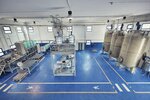

Amazon continues to advance its environmental agenda by allowing innovative start-ups to trial groundbreaking technologies across its European operations.
Through its Amazon Sustainability Accelerator, 11 start-ups have been selected to receive funding and test their sustainability solutions, ranging from energy efficiency to recycling methods. With a potential investment of up to $2.4 million, these pilots aim to address critical environmental issues while promoting long-term partnerships with Amazon.
The selected start-ups will work across the UK, Denmark, France, Germany, and Spain to test pioneering solutions such as recycling electronic waste, developing innovative packaging, exploring new building materials, and leveraging artificial intelligence (AI) to enhance energy efficiency.
These pilots, which will differ in scope and duration, are designed to tackle diverse environmental challenges, with the potential for further partnerships following successful implementation. One example is the UK-based start-up Cheesecake Energy, which will introduce its compressed air and thermal energy storage technology to Amazon’s European fulfillment centers. The goal is to reduce emissions by storing renewable energy generated from solar power, providing electricity during peak demand periods when solar generation is insufficient.
“Storing energy for longer periods is vital as we accelerate towards net zero,” said Michael Simpson, Chief Commercial Officer at Cheesecake Energy. “We are excited to test our innovative technology with Amazon. This will help the company store excess solar energy and use it when needed.”
Cheesecake Energy, originally founded at the University of Nottingham, uses energy storage systems that store solar energy during the day for use at night or when the sun isn’t shining. This technology will be deployed in specific European fulfillment centers to reduce reliance on traditional energy sources.
Another start-up, HT Materials Science from Dublin, is set to enhance heating and cooling efficiency at Amazon’s UK fulfillment centers in Coventry, Daventry, and Doncaster. The company’s nanofluid solution, made with an aluminum-based technology, is expected to reduce energy consumption by up to 14%. This innovative material won the Green Product Award and represents a promising step towards sustainable energy practices.
Meanwhile, US-based Phaidra will deploy its AI tool to improve the energy efficiency of heating and cooling systems at one of Amazon’s UK fulfillment centers. Beginning in early 2025, this AI-driven solution is expected to reduce carbon emissions by up to 40% and cut energy costs by up to 25%. By optimizing energy use in real-time, based on weather conditions and occupancy, Phaidra’s technology could serve as a scalable solution for commercial and industrial facilities.
“Our collaboration with Amazon is a significant step towards achieving a more sustainable future in commercial, industrial, and data center facilities,” said Jim Gao, CEO of Phaidra. “We aim to provide a scalable and seamless solution that not only benefits the environment but also offers substantial savings and efficiency improvements.”
Amazon’s push for sustainability doesn’t stop at energy efficiency. Start-ups Re-Zip and Hipli are piloting reusable packaging systems that will be rolled out across France, Germany, the Netherlands, Belgium, Luxembourg, and Austria. These efforts aim to ship nearly 100,000 orders using unique reusable packaging, significantly reducing waste.
In another pilot, Luxembourg-based Circu Li-Ion will help extend the life of Amazon’s batteries by using robots to disassemble and upcycle lithium-ion batteries. This approach aims to reduce waste and the need to extract raw materials, which is a carbon-intensive process. Circu Li-Ion’s efforts will promote a circular economy model by giving batteries a second life, reducing environmental and financial costs.
Amazon’s internal subject matter experts will work closely with the start-ups throughout these pilot projects, offering guidance and support. This collaboration will allow the companies to fine-tune their technologies to fit Amazon’s operations, ensuring that their solutions deliver the intended impact. Once the pilots are complete, Amazon will assess their environmental benefits, financial viability, and scalability, determining which technologies can be rolled out more broadly.
“This trailblazing program is a testament to Amazon’s commitment to supporting innovation and driving positive change,” said Justine Mahler, Amazon’s Sustainability Director. “By providing a real-world testing ground for unique and cutting-edge technologies, we’re not only reducing our environmental impact but also creating a blueprint for more sustainable practices across industries.”
Since the Amazon Sustainability Accelerator launch in 2022, the program has supported over 40 start-ups across the UK and Europe, awarding over $1.2 million in grants and credits. These start-ups have seen tremendous growth, with average sales increases of 700% and more than $18 million raised collectively.